reflections from working on my first short film: Take Care
One of the most dynamic, exhilarating, and fulfilling days I had this year was a 13-hour shoot day for my first ever short film. Reflecting on it now feels strange, but the more I think about my first "real" filmmaking experience, the more I realize how much I loved being on set and how strongly I crave to be on set again. Being on set made me feel so alive; I was constantly energized, passionate, and thrilled about the work. Even as the hours grew long, it felt like I was just getting started. Even when I felt the burnout creeping in, I had an urge to keep going. It's hard to put into words how at ease I felt on set, but here’s my attempt to describe how my first filmmaking experience went and why it was so satisfying.
For context, the film I worked on was an assignment for the final film class I took in college as part of my film minor. Our group of four to five students collaborated to create a 20-minute short film based on a screenplay written by one of our classmates. The film I volunteered to work on was a queer coming-of-age story titled Take Care, which follows the journey of a 15-year-old Filipino girl.
Take Care follows: “Magdalena, or Lena for short, has a new class project to take care of a fake baby with her boyfriend, Paul. However, during the project, Lena starts to struggle with the relationships around her—like her boyfriend and her mom—because of this new person who comes into her life and makes her question her identity.” This film intrigued me because it was coming-of-age , one of my favorite genres to watch in film, and part of its focus was on a mother-daughter dynamic, which always resonates with me in film. I am so happy that I got to work on this film, as my personal connection to the story made the on-set experiences something I’ll carry with me for my lifetime.
One of the biggest reasons I had so much fun being on set was because of my role and how deeply it aligns with my larger interests, strengths and personality. For this short film, I was the producer. My main responsibilities can be summed up as “not doing the actual creative work required to make a film, but handling everything else.” The “everything else” included logistics, communication, organization, resource gathering, and managing all tasks and people to ensure everything was on track and progress was being made according to our goals . In essence, my responsibility was to make things as easy as possible by taking care of the logistical, operational, and business tasks, so the directors, actors, cinematographer, writer, editor, art director, and others could focus on their specific roles.
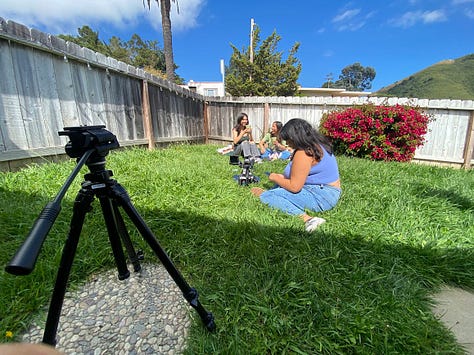
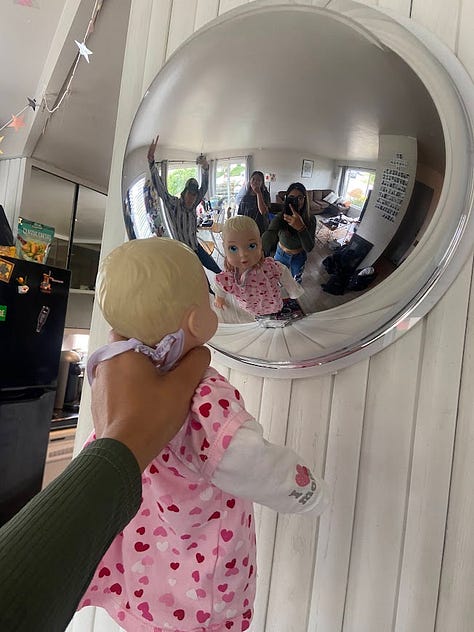
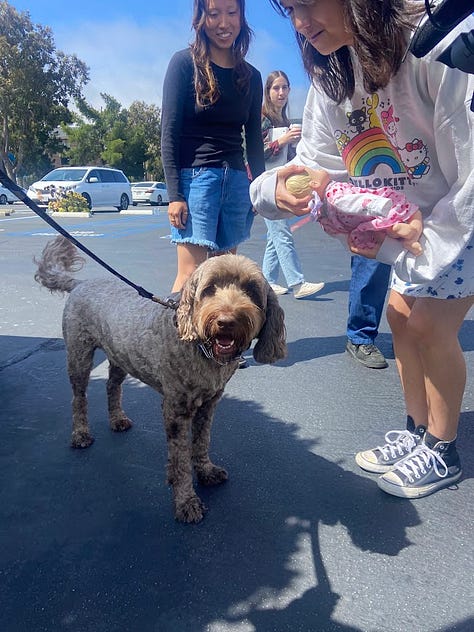
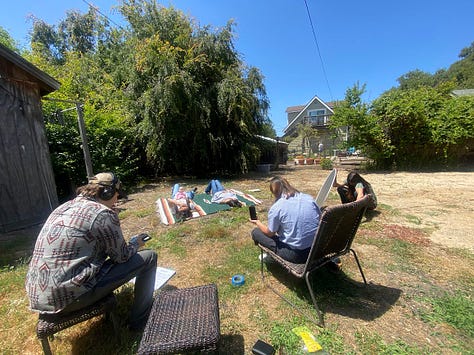
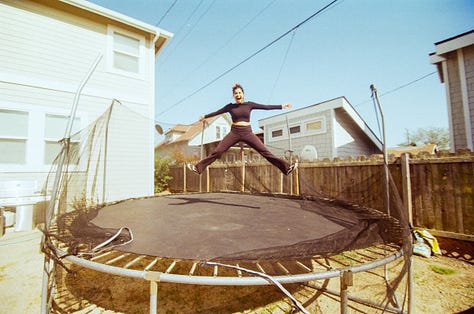
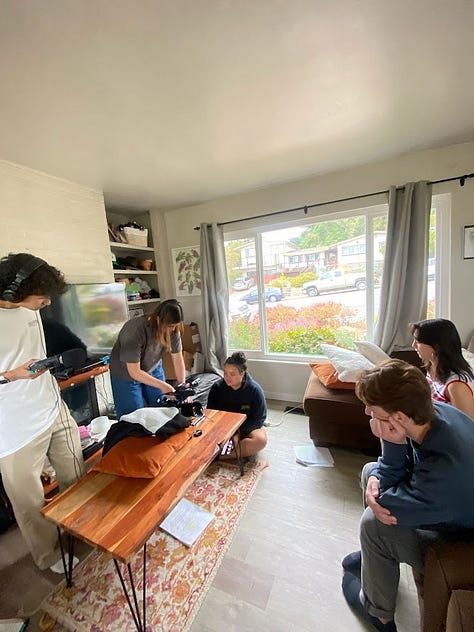
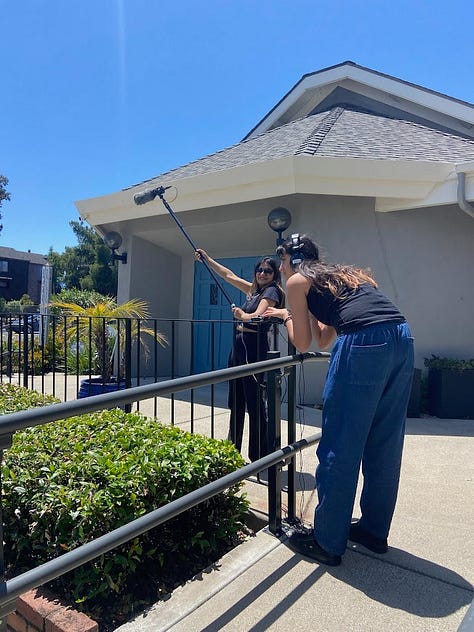
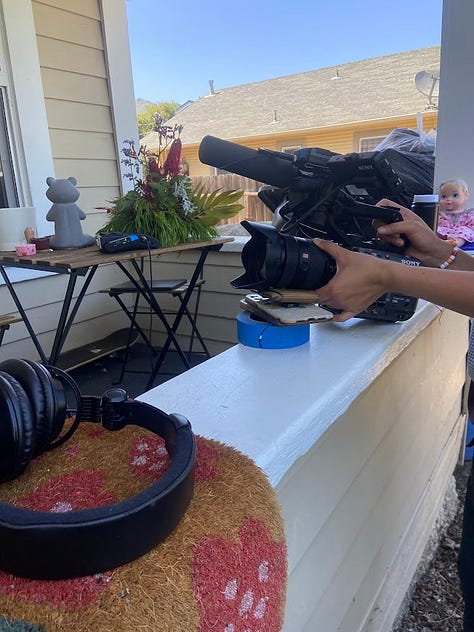
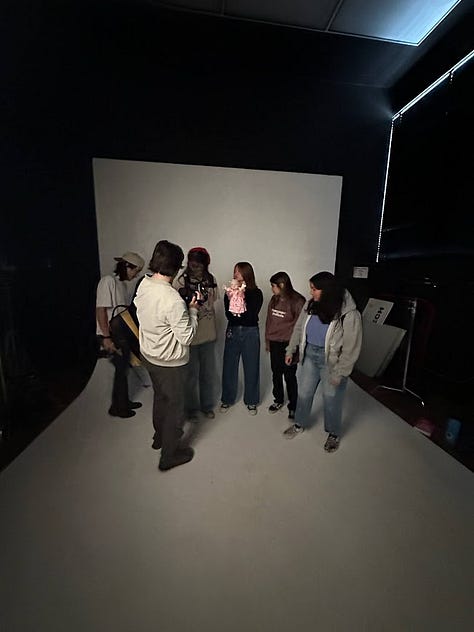
My greatest strengths are being adaptive and flexible and producing relies heavily on those qualities. My responsibilities varied between pre-production, production, and post-production. During production, I handled location scouting, secured filming permissions, and created and managed a Google Drive folder containing the shooting schedule (so much Google Sheets work!), task lists, logistical information, and more. I also hosted check-ins and progress meetings with the cast and crew, helped them problem-solve any issues before shooting, and took on additional tasks as needed. When we were on set, my main goal was to support the cast and crew in any way possible by resolving problems before they could escalate. This included doing caffeine and food runs to keep everyone energized, stepping in for a crew member when they were burnt out, running between houses and our college campus to grab items or pick up and drop off actors, and readjusting the shooting schedule when logistical changes arose. The entire experience was exhausting, spontaneous, and required me to be quick on my feet, but I fully embraced and loved it. During post-production, I got to relax a bit because my primary job was to communicate with the directors and editors to ensure editing was on track and the film would be completed. In summary, as the producer (project manager), I felt like the troubleshooter and backbone of the cast and crew.
Being a producer allowed me to flex my strengths and combine my “business-esque” and nerdy personality in one role. My greatest strengths are being adaptive and flexible, and producing relies heavily on those qualities. For example, there were shoot days when an actor would suddenly need to leave early, so I would quickly readjust the entire shooting schedule to ensure we captured their scene and then communicated the changes to everyone else. This required a combination of quick thinking, adaptability, and efficiency in getting the job ("business") done, which I really enjoyed. At the same time, I got to indulge my nerdy side by revising the color-coded, perfectly diagrammed schedule on Google Sheets to reflect the necessary changes.
When it comes to my larger college education, being a producer is similar to being a project manager. While working on the short film, I was completing a project management course for my senior project. A project manager is someone who plans, organizes, and oversees tasks to ensure a project is completed on time and within budget. I interpreted the role of a producer to be similar to that of a project manager, so it was pretty cool to study project management and apply that knowledge simultaneously while being on set. In fact, being able to apply the knowledge I was gaining about project management through being a producer, made me more motivated to complete my senior project. As a bonus, this intersection between my main degree and film opened up another career path for me to consider.
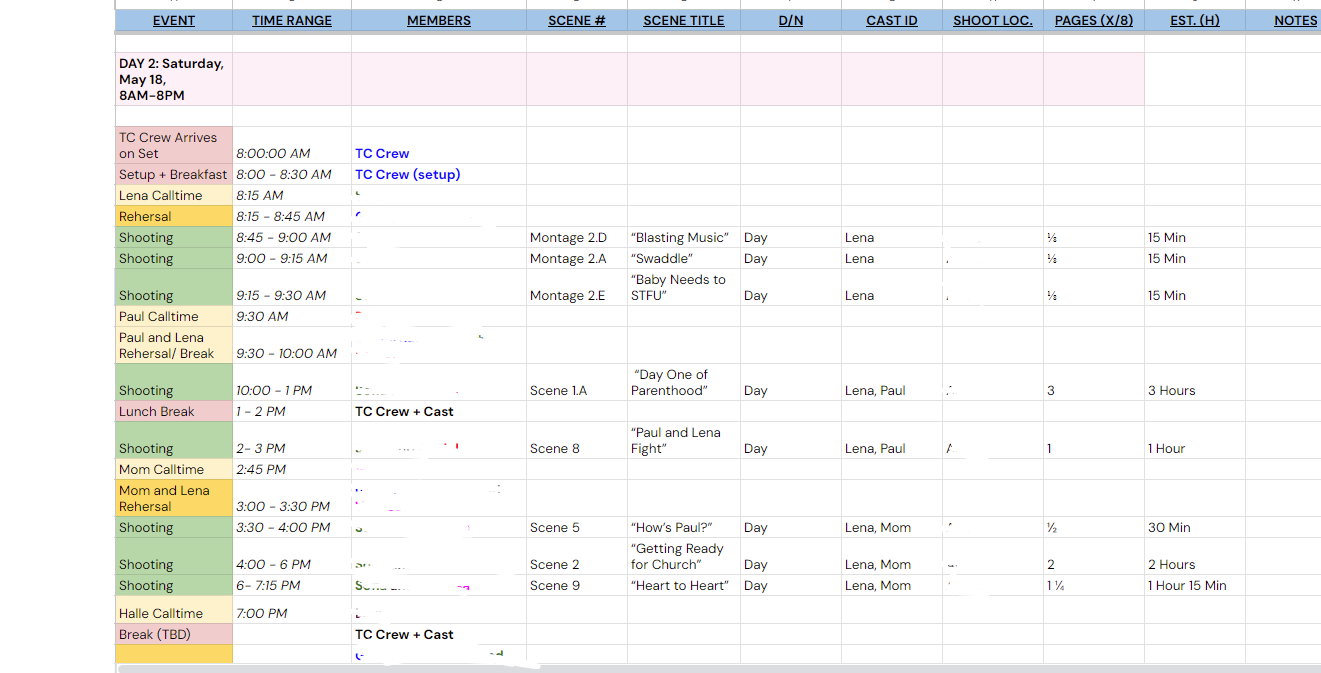
As a film enthusiast, making this short film from scratch was such a gratifying experience , because it only deepened my love and knowledge of this medium. Before making this movie, I gained a lot of my knowledge about the technicalities of film through watching movies, reading reviews, watching videos from critics, and using Google, which was optimal. However, actually making a movie made it much easier and more enjoyable to grasp the details of "what is a film.” Whether it's watching directors discuss how to block scenes and select shots to best tell the story, cinematographers brainstorming camera placements, art directors creating sets, or actors experimenting with facial expressions and line delivery, seeing it all happen in real-time truly emphasizes how much filmmaking relies on details and intentionality. Hearing statements like, “Should I say this line with more sadness or joy?”, “I think we should place the camera on top of the bed to get a close up of her so you can see the sadness on her face” or “When you guys are teasing each other, get closer to demonstrate the chemistry”, was eye-opening. Then once “action” was said, observing all these different moving elements coming together is an out-of-body experience in itself. This is also why I loved being a producer - I got to witness every single element of BTS individually and all together.
This whole experience has changed how I watch films; now, I watch them with admiration and careful observation. I hyper-analyze almost every shot, considering why it was chosen, what message it conveys, and how the blocking is symbolic. I think deeply about the dialogue and its significance within the larger context of the story. I find that dissecting the details of a film is a worthwhile and entertaining experience. It’s not that I didn’t do this before, but now, after making my first short film, I’m equipped with the knowledge to do it better.
Working on this short film has transformed my relationship with the medium in so many ways, and I am forever grateful that I got to end my college experience with such an impactful project. However, no part of this experience would have been as enjoyable without the enthusiastic, kind, passionate, and dynamic cast and crew I had the pleasure of working with. Every member of the team was committed to their role, showed excitement and passion about the work, demonstrated resilience when shooting became challenging or exhausting, and no one overstepped their boundaries or was uncooperative. Everyone stepped up, which made my role as a producer so much easier, as conflict resolution remained within the bounds of technical issues on set, rather than people problems. I was eternally grateful for that supportive environment. I feel incredibly blessed and lucky to have worked in such a positive setting for my first film because, from my own discussions and research, film sets can become challenging and somewhat difficult very quickly. Shoutout to the Take Care cast and crew for making it so smooth!
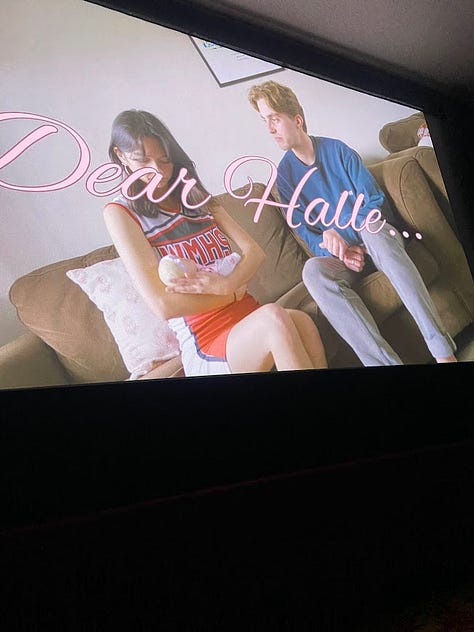
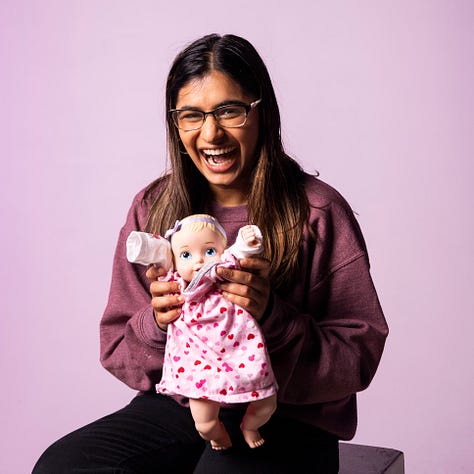
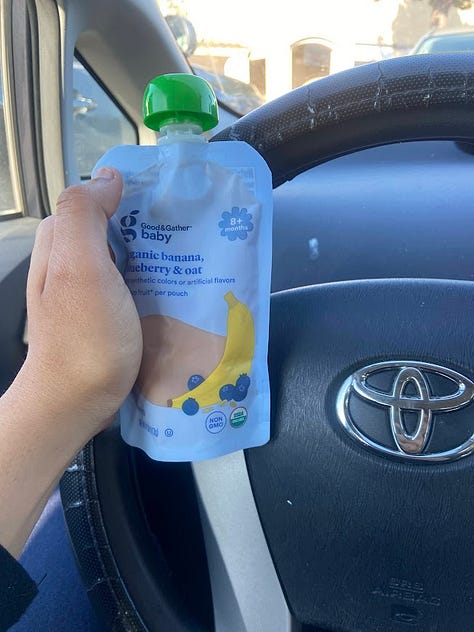
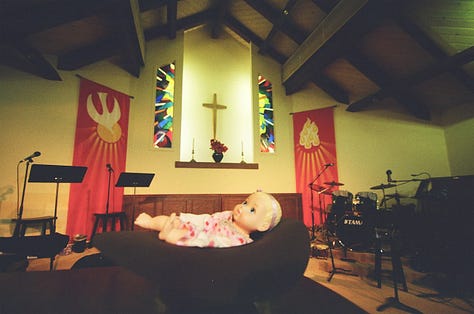
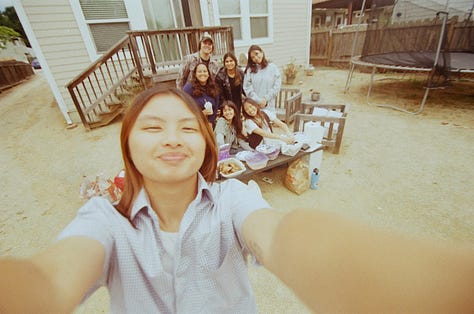
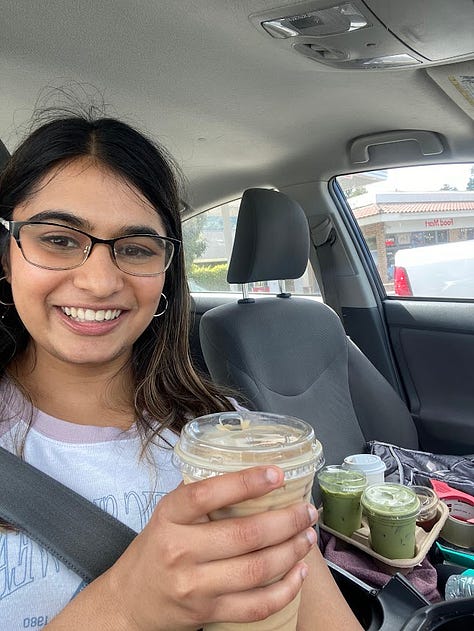
In conclusion, working on this film has been one of my favorite projects during my educational journey, and I am so happy to have ended my college experience with it. Watching the film on the big screen was a bittersweet moment. On one hand, it was surreal and exhilarating to see the story we poured our hearts, souls, and minds into over 50+ hours culminate in a tender, emotionally resonant 18-minute queer coming-of-age story. On the other hand, it was sorrowful because we knew that with the film on the big screen, it marked the end of our journey. For me, the mixed emotions were deeply depressing to experience. As they say, "all good things must come to an end," and while I am sad that Take Care had to conclude, I am eternally grateful for its existence and the profound impact it had on me, deepening my love for the medium of film even more than before.
Question for Reader: If you have worked on a film set, what was your favorite part of it?



